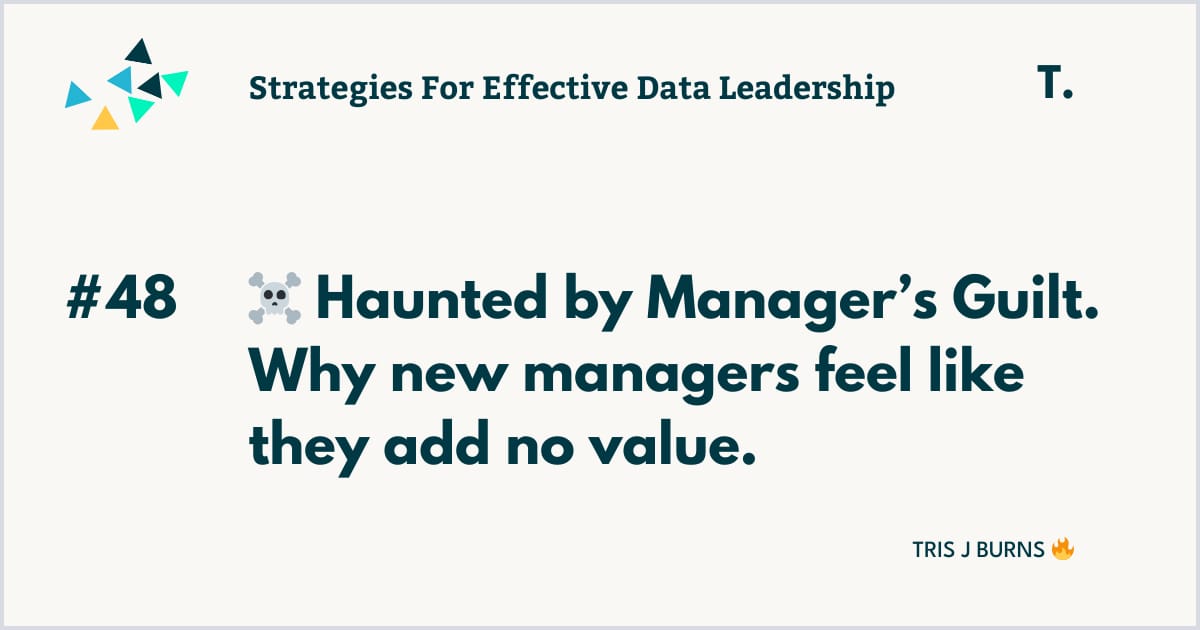
READ TIME: 5 MINUTES
🤷♂️ Ever feel like your not adding value?
“What do you even do here, man”?
It’s a question I was asked thousands of times in my last role as a data leader.
Every time I was asked this question, I felt more and more like a fraud, like I was adding no value and that I didn’t deserve to be in the role. But it wasn’t a colleague or someone on my team asking me this.
It’s a question I was asking myself… and I’ll bet it’s one you’ve asked yourself.
Let me tell you a story 👇🏻
One of my coaching clients was recently promoted to data manager at her company (big congrats on the promo👏🏻).
She now leads a team of 9 analysts that partner with a variety of business units providing analytics support. A lot of responsibility for any first time data leader.
Despite this, one nagging concern keeps cropping up for her….
Having only recently been an IC but now a manger, there is a strong need for her to feel like she is adding tangible value - by writing code. Having smashed out her 9-5 as a manager, she now feels the need to work 5-9 writing code and delivering dashboards…😬
Newly appointed data leaders often suffer from the feeling that they’re not adding tangible value through their work.

As I mentioned above, it’s a feeling that I’ve experienced, as have many others.
You’ve gone from being an individual contributor to leading a team. Until now, your job has been to produce data analysis and products. But as a manager, the job is now quite different.
It’s no longer about how ‘productive’ you are.
It’s about how well your lead your team to maximise their productivity.
Now, I’m not saying that managers need to be completely hands off. In fact, it is great if you’re able to maintain some of your skills and know your way around their orgs data capabilities.
BUT, if you plan to succeed as a manager (rather than as an IC) then you’re going to want to overcome this ‘manager’s guilt’ ASAP.
You’re no longer being assessed as an IC. Your performance is now be measured by your ability to lead the team.
Have you experienced the guilt that goes with being a new manager?
☄️ The impact of remaining hands on!
Trying to balance the two priorities of being both a strategic leader as well as an individual contributor is like walking a greasy tightrope. It’s very difficult to maintain the necessary balance to succeed in both areas.
And as a new manager, you won’t be giving nearly enough oxygen towards establishing your skills in strategic leadership.
But that won’t be you’re only challenge, as you’ll see below:
🥎 Player-Coach dynamic:
The dual role of contributing individually whilst also leading the team. It’s certainly ok to dip in when needed as a player but it also very easy to get stuck there. It then becomes harder to step away as demand on the leadership side increases. It also creates role ambiguity among the team mates you’re supposed to be managing.⚙️ Constantly switching gears and context:
If one minute you’re operating at the strategic level, and the next minute you’re in the weeds writing code or buried deep in a spreadsheet, then you’re likely not going to be great at either task. And it will fry your brain. 🧠
😫 Burnout from working too hard:
If you’re doing the 9-5 as a manager and then burning the candle to 5-9 on analysis tasks it doesn’t take a genius to realise you’re going to soon hit a wall. If you’re cramming all of it into the day then you’re basically half-assing both roles.
🫡 Unlikely to be respected as a level peers:
When I was a Global Head of Data, my colleague in design once said to me, “if I have to open Figma, then someone isn’t doing their job”. While I don’t advocate that a data leader shouldn’t be using Excel or PowerBI on occasion, remaining super hands on with data tasks is result in your being a less effective strategic leader among your peers.
📚 Limits learning opportunities for your team:
A manager’s role is to nurture and support the talents and growth of their team. If the manager is constantly involved in hands-on work than it’s possible that they’re depriving their team members of a learning and growth opportunity. This is particularly damaging when the reason for involvement by the manager is because they’re more technically capable then the people they manage.
At the heart of this challenge is a sense of guilt. It’s normal for any manager to feel like they’re not doing enough and that they have nothing to show for the hours they’ve put in.
To overcome this requires a shift in mindset. Your focus will have to move from immediate outputs, to longer term team outcomes.
🛠️ How to fix it/Get the hell over it.
Apart from working with me as your data leadership coach 😉 the only way to fix this problem, is to basically get over it.
A new manager must shift their mindset by reframing "tangible work" to include the value of empowering their team, driving strategy, and removing obstacles.
You need to focus on the outcomes your team achieves collectively and understand that your role now lies in enabling others’ success rather than solely in individual output.
Recognising that your impact comes from decision making, mentorship, and fostering an environment where your team can thrive will help to reduce the guilt. This become especially true when you start measuring success by the team's accomplishments rather than your own individual tasks.
Regularly reflecting on how your leadership contributes to the team’s growth, morale, and performance can reinforce this shift and build confidence in the value you bring as a manager.
📧 I’d love to hear from you:
What’s been your experience of manager’s guilt? How has it affected you or how have you overcome it?
Hit reply and tell me your story!
🌟 DIY Coaching For Data Careers 🌟
If you’re interested in data leadership coaching, but not yet ready to commit to the full fat version, then my DIY Coaching product could be for you.
DIY Coaching helps data professionals unlock and maximise the potential of their data careers in their own time and at their own speed.
This self-paced email series and accompanying exercises provides actionable tools to help data professionals navigate career transitions, set goals, and achieve success.
To learn more about this hugely popular product and to purchase, click here!

Tristan Burns
💡 Helpful resources for data professionals:
The Data Leadership Frameworks: This email series containing 10 data leadership frameworks, will equip you with the necessary skills and knowledge to maximise your effectiveness and become the influential and powerful data leader you know you can be.
DIY Coaching Program: Through a series of 9 self-guided exercises, you’ll clarify your goals, overcome obstacles, and create a plan for your next career move - all at your own pace.
⚡️Three more ways I can help you:
Private Coaching for Data Leaders: I work with data professionals looking to grow into influential and unstoppable data leaders to help them navigate and overcome the challenges of being a data leader.
Group coaching for Data Teams: Great data teams can make or break businesses. Through my facilitated 6-week group coaching program, together we get to the heart of what is holding teams back and set a course for data-driven success.
Google Analytics, Tagging and Looker Support: Helping teams to set up or optimising their data eco system, generate actionable insights and gain more in-depth knowledge through training.
What did you think of this email?
If you enjoyed this newsletter, why not forward it to a friend.
Did someone forward you this email? You can subscribe to Strategies for Effective Data Leaders here!

